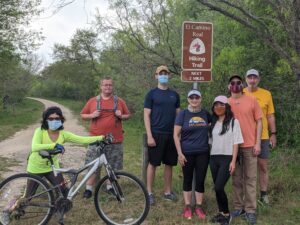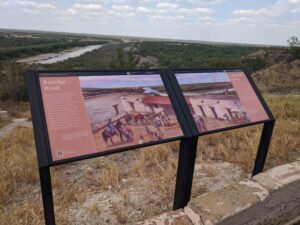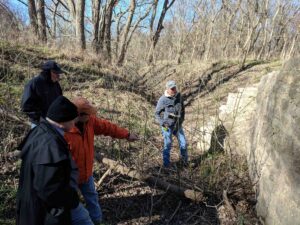The El Camino Real de Los Tejas National Historic Trail Association (ElCat) provided the following highlights for the El Camino Real de Los Tejas NHT during the 2021 calendar year:
Local Economy, Tourism and Community Health

Trail de Flores chapter members and the general public enjoy hiking a section of the Floresville El Camino Real hiking trail in Floresville, Texas in March 2021. Photo by Steven Gonzales, ElCaT.
In March, ElCaT’s Trail de Flores chapter organized a hike on the Floresville El Camino Trail. The event provided the chapter an opportunity to educate the public about the history of the trail and surrounding properties, as well as to discuss future trail development plans. A Facebook live event was broadcast during the hike.
In June, the chapter organized a National Trails Day event in collaboration with the Floresville Hike and Bike Trail Committee. The event included a trail hike, information tables from both the chapter and the Floresville Hike and Bike Trail Committee, ElCaT’s impressive educational traveling exhibit, and remarks by local and chapter officials. The chapter was grateful for the support from and attendance by the Floresville Mayor, City Council members, and City Manager, as well the leadership team from the Floresville Economic Development Corporation. The Chapter estimates approximately 50 community members attend the event, and all appeared enthusiastic about the renewed emphasis on making the trail a part of the community fabric, and for the foresight of those involved in seeing the potential for the trail to be a stimulus for city growth.
Education, Interpretation and Cultural Expression

Interpretive panels installed at the US-Mexico border on the Rio Grande Overlook at Arroyo San Francisco in Zapata County, Texas. Photo by Steven Gonzales, ElCaT.
In 2021, National Park Service, National Trails office (NTIR) staff worked with an award-winning exhibits design and development firm and El Camino Real de los Tejas NHT Association (ElCaT) and other partners to develop bilingual wayside exhibits across El Camino Real de los Tejas National Historic Trail (ELTE). This project developed exhibits for four locations across the trail from the Rio Grande on the Mexico border to the end of the trail in Louisiana. NTIR worked with ElCaT, the Texas Department of Transportation, Zapata County, a private landowner, the Texas Historical Commission, and Louisiana State Parks to develop the content and have the exhibits installed at Rio Grande Overlook at Arroyo San Francisco, Apache Pass, Mission Dolores State Historic Site, and Los Adaes State Historic Site.
The exhibit design firm created illustrations which NTIR staff can use for other projects, and the design elements established by the contractor are being used for other projects along the route. Prior to this project only one other site had NPS-developed waysides along ELTE.
Other Highlights

ElCaT partners from GTI Environmental, LLC and the Travis County Historic Commission look at historic resources in Onion Creek Metropolitan Park in Austin, Texas. Photo by Steven Gonzales.
El Camino Real de los Tejas National Historic Trail Association (ElCaT) is working on a study-route of the trail between Menchaca Springs and McKinney Falls State Park in Austin, Texas. The study-route crosses through Onion Creek Metropolitan Park (OCMP), which is a City of Austin property.
The study is taking place because we know that, historically, McKinney Falls was a crossing of Onion Creek. And though the site is recognized as an official trail resource, the Congressionally-designated NHT trail-line does not go through it. Therefore, in order to fit the puzzle pieces together, we initiated a Community Activated Parks Project with The City of Austin Parks and Recreation Department to conduct historic and archaeological research within OCMP. Our hope is that the written record, combined with artifacts recovered during the archaeological reconnaissance, will demonstrate that the study-route is a historic route of the Camino.
The cost of the project is $85,000 and, to-date, about $34,000 has been raised towards the effort. The historic research is near completion and it has already demonstrated that the study-route and OCMP are part of multiple Spanish expeditions dating to the early 1700s. Ongoing fundraising is also occurring to allow for the archaeology to take place and it is our hope that the overall findings will lead to greater understanding of the historic routes of the trail in Central Texas, while also allowing for new recreational and educational opportunities for the public in OCMP, McKinney Falls, and places in between! Stay tuned for more details!